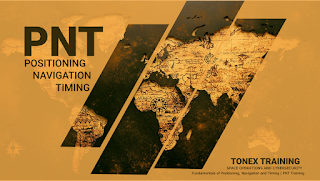Fundamentals of Positioning, Navigation and Timing PNT Training

“PNT” stands for Positioning, Navigation and Timing. PNT is a combination of three distinct, constituent capabilities: Positioning, Navigation and Timing
What is Positioning ?
Positioning is the approach, tactics and efficiency to correctly establish someone's location and orientation with 2 dimensions. Or 3-dimensionally when required.
In fact, it’s referenced to a standard geodetic system like World Geodetic System 1984, or WGS84.
What is Navigation ?
Navigation is the tactics to find out current and desired position and apply corrections to course, orientation, and speed.
The objective is to attain a desired position anywhere around the world, from sub-surface to surface and from surface to space.
What is Timing ?
Timing is the approach, method to acquire and maintain accurate and precise time from a standard anywhere in the world and within user-defined timeliness parameters. Timing also includes time transfer. Timing usually uses standard like Coordinated Universal Time, or UTC.

What is PNT ?
“PNT” stands for Positioning, Navigation and Timing. PNT is a combination of three distinct, constituent capabilities: Positioning, Navigation and Timing
What is Positioning ?
Positioning is the approach, tactics and efficiency to correctly establish someone's location and orientation with 2 dimensions. Or 3-dimensionally when required.
In fact, it’s referenced to a standard geodetic system like World Geodetic System 1984, or WGS84.
What is Navigation ?
Navigation is the tactics to find out current and desired position and apply corrections to course, orientation, and speed.
The objective is to attain a desired position anywhere around the world, from sub-surface to surface and from surface to space.
What is Timing ?
Timing is the approach, method to acquire and maintain accurate and precise time from a standard anywhere in the world and within user-defined timeliness parameters. Timing also includes time transfer. Timing usually uses standard like Coordinated Universal Time, or UTC.
Fundamentals of Positioning, Navigation and Timing (PNT Training).
Tonex Training offers 2 days training on PNT. All the attendees will have opportunity to learn about Positioning, Navigation and Timing in depth.
Learn About
Learn more about PNT Training
Tonex Training offers 2 days training on PNT. All the attendees will have opportunity to learn about Positioning, Navigation and Timing in depth.
Learn About
- PNT Network detail with positioning, navigation and timing.
- PNT & Spectrum Management Fact
- Map data, GPS, Other data like weather or traffic data.
- Modern navigation system & control system
- Space operation and cybersecurity
- Cybersecurity Maturity Model Certification (CMMC)
- EW, SIGINT, MASINT, Ground-based radar,
- Workshop, Certifications and more.
Learn more about PNT Training
Comments
Post a Comment